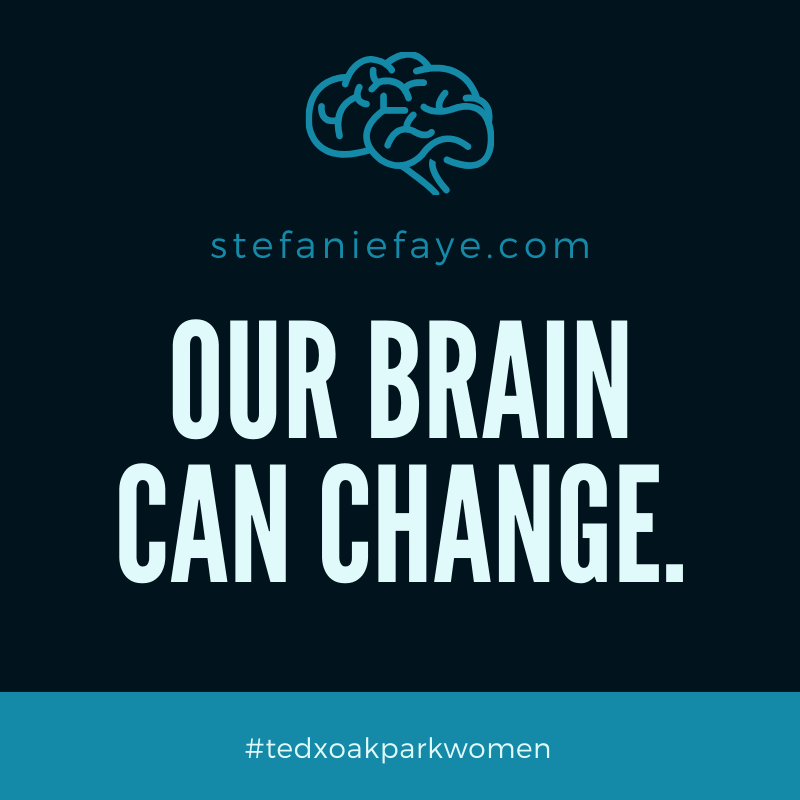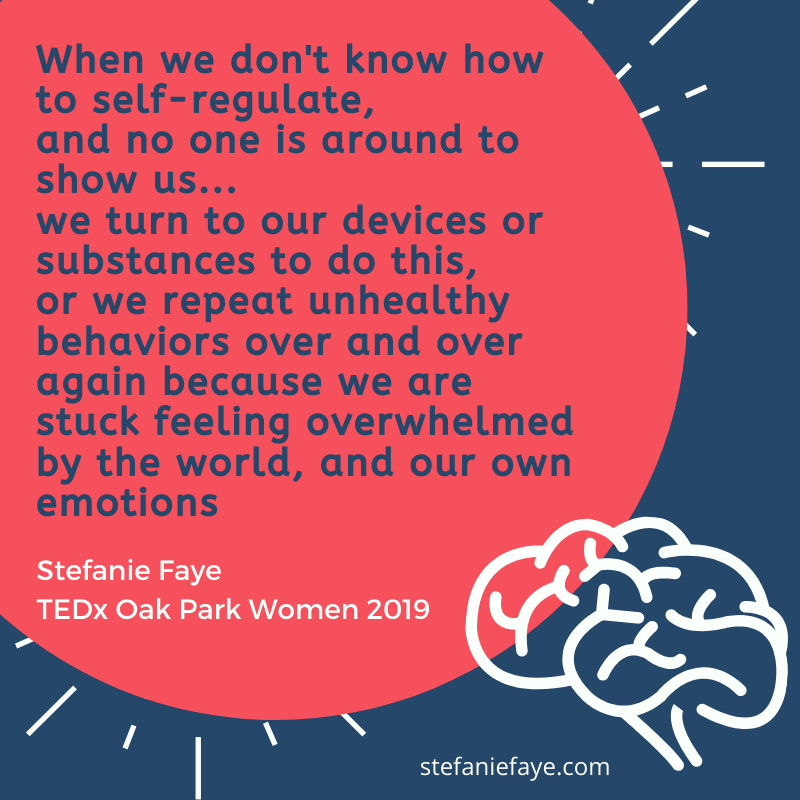"Everyone needs to hear this. Period."
-Mikkel, YouTube subscriber
"One of the best TedX talks I have ever seen, practical & intellectual,
there are even references at the end. Thank you Stefanie!"
-Munir Rashid, Leadership Facilitator & Executive Coach, Berlin
"These are insights I can apply to my professional life as well as my parenting."
-JD Lanigan, Owner, Performance Consulting International
As a species, we are at a crossroads. There are so many young people right now who are surrounded by parents, caregivers, teachers and leaders who themselves are 'dysregulated' - who do not know how to manage their emotions and deal with stress in healthy ways. This means that most humans do not have a role model for what self-regulation looks like on a daily basis. The human species, as a whole, is lacking 'prefrontal cortex models'.
When people don't know how to self-regulate, it's because no one is around to show them. They then turn to devices, or substances as a way to 'feel better'. Or they repeat unhealthy behaviors over and over again because they are stuck feeling overwhelmed by the uncertainties of the world, their future and their relationships and they don't know how to soothe themselves any other way.
This is a tragedy, because the human brain has within its design, the capacity to make us 'feel better' - without the need for substances or devices. It can do this through 'self-regulation' (using our own mind) and 'co-regulation' (using connection with others) to regulate our internal physiological state, heart rate and neuro-chemical activity.
A strategy? Become a 'pfc model'. We can do this by learning how to self-regulate as a practiced skill.
I created this talk to help spread awareness of why we need to surround ourselves with - and try to become - wise, self-aware and nurturing “brain models” in order for the human species to evolve to its highest potential.
We cannot keep acting as though anxiety, depression, suicide, bullying and substance abuse are things that just ‘happen’ to people.
These are symptoms of being overwhelmed by life and not having teachers, leaders and caregivers who can model what it looks like to self-regulate and find self-compassion. The solution? We must become those models by strengthening our own self-regulation networks.
I'll be sending the Self-Regulation Handbook to subscribers at the end of April, so stay tuned!
In the mean time, I recommend these three resources:
TEDx talk: A call for "PFC Model" to help humanity self-regulate
Podcast Episode 5: Self-Regulation - the most remarkable skill that will make you a better human

Having an experience-dependent brain means that although our past plays a role in how we react to things now, it ALSO means we can choose new experiences to build powerful NEW neural circuitry.
Please share this with anyone who who wants to understand how to unleash the potential of the human mind.
Click here if you'd like to read the full transcript

References:
Aoki, C., & Siekevitz, P. (1988). Plasticity and brain development. Scientific American, 259, 56-58.
Bowlby, J. (1969). Attachment and loss. Vol. 1: Attachment. New York: Basic Books.
Diamond, S., Balvin, R. & Diamond, F. (1963). Inhibition and choice. New York: Harper & Row.
Gogtay et. al., (2004). Dynamic mapping of human cortical development during childhood through early adulthood, Proceedings of the National Academy of Sciences, 101.
Harvard Center on the Developing Child: developingchild.harvard.edu
Hensch TK. (2005). Critical period plasticity in local cortical circuits. Nat Rev Neurosci.,6:877–888.
Jando et al, (2012). Early-onset binocularity in preterm infants reveals experience-dependent visual development in humans, Proceedings of the National Academy of Sciences, 109.
Martin et al. (1988). Developmental stages of human brain: an MR study. Journal of Computer Assisted Tomography, 12, 917-922.
Noebels, J.L. (1989). Introduction to structure-function relationships in the developing brain In P. Kellaway & J.L.Noebels (Eds.), Problems and Concepts in developmental neurophysiology (pp. 151-160). Balitimore: Johns Hopkins University Press.
Renner, M.J. & Rosenzweig, M.R. (1987). Enriched and impoverished environments. New York: Springer.
Scherer, J. (1967). Electrophysiological aspects of cortical development. Progress in Brain Research, 22, 48-489.
Schore, A. N. (2016) Affect Regulation and the Origin of the Self. New York: Taylor and Francis..
Sur M, Rubenstein JLR. (2005) Patterning and plasticity of the cerebral cortex. Science.310, 805–810.



Thank you, Amin! I appreciate you taking the time to watch and comment 🙂
Very informative TED Talk on the brain. I enjoyed it.